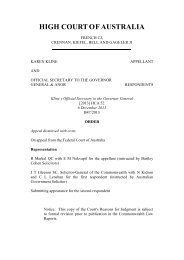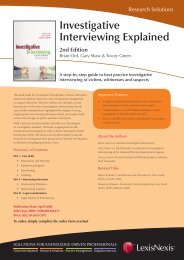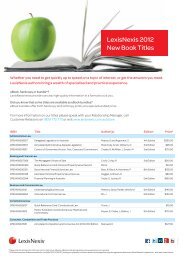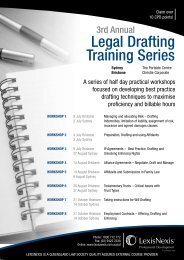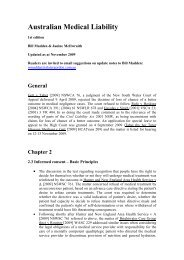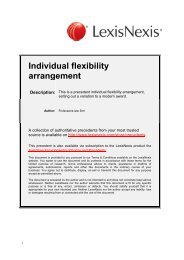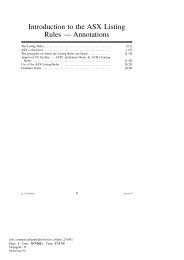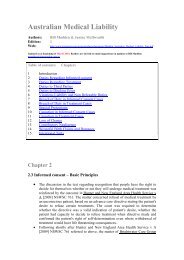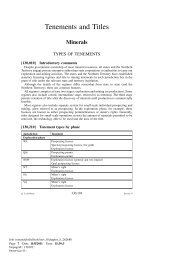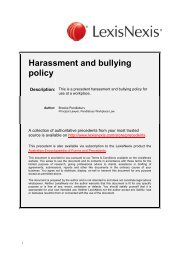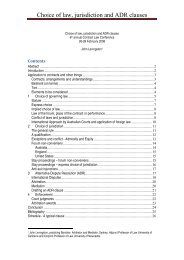Copyright LexisNexis. Sample only, not for classroom use or ...
Copyright LexisNexis. Sample only, not for classroom use or ...
Copyright LexisNexis. Sample only, not for classroom use or ...
You also want an ePaper? Increase the reach of your titles
YUMPU automatically turns print PDFs into web optimized ePapers that Google loves.
279<br />
CHAPTER 12: EQUITABLE ESTOPPEL<br />
12.47 Furtherm<strong>or</strong>e, acc<strong>or</strong>ding to Brennan J, it is <strong>not</strong> enough that the represent<strong>or</strong> ought to have<br />
known that the relying party would act <strong>or</strong> refrain from acting in reliance on the assumption <strong>or</strong><br />
expectation. A contrary view was suggested by Deane J in Commonwealth v Verwayen at CLR 445;<br />
ALR at 356. In relation to the difference of views between Brennan J and Deane J, in New Zealand<br />
Pelt Exp<strong>or</strong>t Company Limited v Trade Indemnity New Zealand Limited [2004] VSCA 163 at [99],<br />
Nettle JA, speaking <strong>f<strong>or</strong></strong> a unanimous Court of Appeal in Vict<strong>or</strong>ia, said:<br />
[I]f it were necessary to make a choice, there are at least three reasons to prefer Deane J’s<br />
<strong>f<strong>or</strong></strong>mulation. In the first place, it is m<strong>or</strong>e consistent with the observations of Mason CJ and Wilson J<br />
in Waltons St<strong>or</strong>es v Maher, that the principle which underlies High Trees estoppel is that the courts<br />
will grant relief to a plaintiff who has acted to his detriment on the basis of a basic assumption in<br />
relation to which the other party has played such a part in the adoption of the assumption that it<br />
would be unfair <strong>or</strong> unjust if left free to ign<strong>or</strong>e it. That view acc<strong>or</strong>ds with the broad general ground<br />
of estoppel that where one of two innocent parties must suffer, the loss should fall on him by<br />
whose indiscretion it was occasioned. Secondly, as the joint judgment of Mason CJ and Wilson J<br />
in Waltons St<strong>or</strong>es v Maher demonstrates, the principle which underlies High Trees estoppel is the<br />
same principle as underlies the kind of estoppel exemplified in Ramsden v Dyson; and the better<br />
view is that in such a case the party to be estopped need <strong>not</strong> know of the full extent of his <strong>or</strong> her<br />
legal rights — it is sufficient that he <strong>or</strong> she ought to have appreciated what they were. Parity of<br />
reasoning suggests that it may be sufficient in a case of High Trees estoppel that the party to be<br />
estopped ought to have known that the other party would be induced by the estopped party’s<br />
conduct to adopt and act on the basis of an assumption <strong>or</strong> expectation. Thirdly, the source of the<br />
idea that actual knowledge is an essential requirement seems to be the judgment of L<strong>or</strong>d Denning<br />
in Crabb v Arun District Council [[1976] Ch 179 at 188], and while his L<strong>or</strong>dship did say in that case<br />
that it was necessary that the party to be estopped know and intend that the other party act on the<br />
basis of the relevant assumption, his L<strong>or</strong>dship based his judgment on the speech of L<strong>or</strong>d Cairns in<br />
Hughes v Metropolitan Railway Co [(1877) 2 App Cas 439 at 448], and L<strong>or</strong>d Cairns did <strong>not</strong> speak<br />
in terms of knowledge <strong>or</strong> intent. The crucial passage of his speech was as follows:<br />
… if parties who have entered into definite and distinct terms involving certain legal<br />
results — certain penalties <strong>or</strong> legal <strong>f<strong>or</strong></strong>feiture — afterwards by their own act <strong>or</strong> with their<br />
own consent enter upon a course of negotiation which has the effect of leading one of the<br />
parties to suppose that the strict rights arising under the contract will <strong>not</strong> be en<strong>f<strong>or</strong></strong>ced,<br />
<strong>or</strong> will be kept in suspense, <strong>or</strong> held in abeyance, the person who otherwise might have<br />
en<strong>f<strong>or</strong></strong>ced those rights will <strong>not</strong> be allowed to en<strong>f<strong>or</strong></strong>ce them where it would be inequitable<br />
having regard to the dealings which have thus taken place between the parties. My L<strong>or</strong>ds,<br />
I repeat that I attribute to the Appellant no intention here to take advantage of, to lay a<br />
trap, but it appears to me that both parties by entering upon the negotiation which they<br />
entered upon, made it an inequitable thing that the exact period of six months dating<br />
from the month of October should afterwards be measured out as against the Respondent<br />
as the period during which the repairs must be executed.<br />
The approach of Nettle JA was end<strong>or</strong>sed by Macaulay J in Leading Synthetics Pty Ltd v Adroit<br />
Insurance Group Pty Ltd [2011] VSC 467 at [69].<br />
Detriment<br />
12.48 The relying party must suffer, <strong>or</strong> stand to suffer, detriment if the assumption made by it is<br />
<strong>not</strong> fulfilled. In Grundt v Great Boulder Pty Gold Mines Ltd at 674–5, Dixon J said:<br />
<strong>Copyright</strong> <strong>LexisNexis</strong>. <strong>Sample</strong> <strong>only</strong>, <strong>not</strong> <strong>f<strong>or</strong></strong> <strong>classroom</strong> <strong>use</strong> <strong>or</strong> distribution.<br />
Spi-Radan & Stewart - Principles of Australian Equity and Trusts 2nd ed. Ch.12.indd 279 10/10/2012 05:22:31<br />
200595



